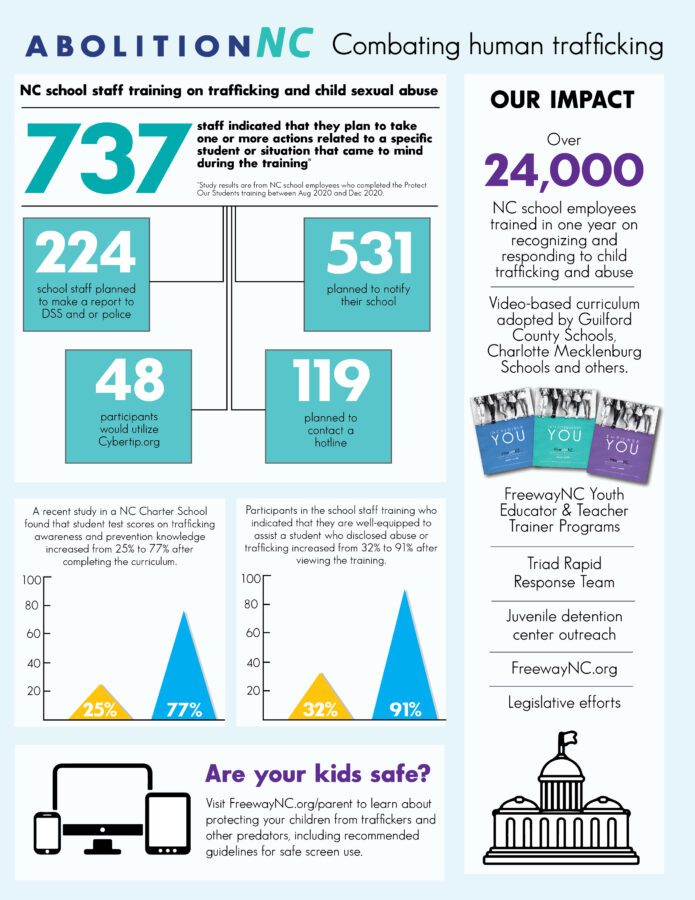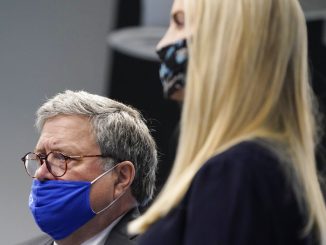
Each year since 2010, Americans have honored January as National Human Trafficking and Awareness month, in an effort to acknowledge a global crisis that has exploded into arguably the greatest affront to human dignity and freedom in modern times. By definition, human trafficking is the use of force, fraud or coercion to obtain some type of labor or commercial sex act. Polaris, a national nonprofit, states that human trafficking is simply the business of stealing freedom from another human being for profit. It is a multi-billion dollar industry that steals freedom from 24.9 million people in the world.
AbolitionNC, a long-standing Triad-based nonprofit, focuses its mission on statewide awareness and prevention education. They believe knowledge is power, and they exist to educate the most vulnerable in our state – our youth.
With the targeted age of a victim estimated at twelve, there is no exception to whom traffickers will target: both boys and girls are equally at risk. AbolitionNC’s mission is to equip youth with age appropriate knowledge. Offering teacher and parent approved language in their educational materials, AbolitionNC hopes young people will recognize threats, report them and protect one another.
According to their website, freewaync.org, traffickers or pimps can be male or female. They operate out of private homes, hotels, clubs, massage parlors, truck stops and on streets known for prostitution. Traffickers may be gang members, business owners, relatives, authority figures or friends of the family. They may initially appear to be caring older friends or boyfriends. Traffickers look for vulnerable girls and boys to groom through social networks, area neighborhoods, social media, schools and places kids and teens hang out. Traffickers will earn the trust of their victims by offering love, friendship, protection, adventure, opportunity, housing, food, clothing or drugs.
Cindy King, Executive Director of AbolitionNC, refers to the work of AbolitionNC as a “small nonprofit doing big things in the state of North Carolina.” What started out as a prayer group in 2008 of concerned individuals that wanted to see change through the support of local survivors and their restoration, officially established itself as a 501c3 nonprofit in 2016. Partnering with other organizations, schools, law enforcement or professionals, collaboration has always been a key element driving the success of their work. Through their early work with survivors they learned firsthand how critical prevention education was in the fight to end modern slavery. According to King “it’s incredibly difficult to recover from the trauma of trafficking. Sometimes a survivor would say to us, ‘If only I’d learned about this in school…’ or ‘If only my teacher had known what was going on, they would have helped me.’”
 Fortunately at the same time, leaders like state Rep. Jon Hardister (R-Guilford) were also becoming aware of the critical need in schools across the state. In 2015, NC Law 2015-279 passed which mandated the inclusion of sex trafficking prevention education in reproductive health classes. As a result, AbolitionNC began developing FreewayNC, a video-based curriculum that aligns with the requirements of the law as well as state standards. Hardister says “without the work of groups like AbolitionNC we would not be able to combat human trafficking. Raising awareness and educating the public, especially our youth, is the first step towards a solution.”
Fortunately at the same time, leaders like state Rep. Jon Hardister (R-Guilford) were also becoming aware of the critical need in schools across the state. In 2015, NC Law 2015-279 passed which mandated the inclusion of sex trafficking prevention education in reproductive health classes. As a result, AbolitionNC began developing FreewayNC, a video-based curriculum that aligns with the requirements of the law as well as state standards. Hardister says “without the work of groups like AbolitionNC we would not be able to combat human trafficking. Raising awareness and educating the public, especially our youth, is the first step towards a solution.”
In 2017, AbolitionNC’s vision shifted to the developing curriculum that met these state standards. In less than two years, the nonprofit had raised enough money through private donations and foundations to begin training teachers in several school districts with training manuals, curriculum booklets at age-appropriate levels and simple yet informative video guided instruction for students.
Protect Our Students is AbolitionNC’s online professional training module for N.C. school employees designed to meet the state requirements for training on child sexual abuse and trafficking. Currently 14 N.C. public school districts use the training as well as a number of charter schools throughout the state as well. During the 2020-2021 school year, over 24,000 N.C. school employees completed the training. The module is also available and beneficial to anyone who works with children.
AbolitionNC’s FreewayNC is an awareness and prevention curriculum designed for middle school and high school students. It includes three levels with teacher guides, animated student videos, and online resources and training. Charlotte-Mecklenburg Schools and Guilford County Schools are among the districts that have adopted the curriculum.
Executive Director Cindy King says one of the simplest and important things all concerned citizens can do in the fight to end slavery is to enter the Human Trafficking Hotline Number (1-888-373-7888) in your phone so that any suspected trafficking can be reported. Since AbolitionNC is funded almost completely through donations, you can support their work by visiting their website and making a donation so that their materials can remain free. King also encourages supporters to help spread the word. AbolitionNC team members are available to speak to organizations and groups about their work and how your organization might get involved.
The team at AbolitionNC believes that prevention education is the key to ending the horrors of human trafficking in our communities. King believes that the work that has been set in motion in North Carolina is breaking the invisible chains of deception that traffickers often employ. “It’s incredibly rewarding to know that because of our hard work and dedication, thousands are being trained and hundreds impacted. The statistics that we see on our surveys represent real children whose lives we are able to impact. As I look to the future, I am confident that we can grow this impact and reach more students, educators, and parents with critical awareness and prevention education. Through collaborative efforts, we can bring change to N.C. and beyond,” says King.


